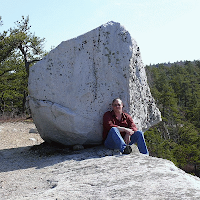I just finished a new book titlted Everything You Know About Indians Is Wrong by Paul Chaat Smith. Smith is a curator for the National Museum of the American Indian in Washington, D.C. (a great place, by the way, I've been there twice) and of Comanche descent.
It's an uneven collection of essays (some are a bit too artsy for my taste) on what it's like to be a Native American in modern America. Lots of interesting cultural observations based on his experiences which range from growing up in a suburb with middle-class parents to his involvement in the American Indian Movement (AIM) to being a museum art curator today.
One thing that resonated with me is the following observation from one of the last essays in the book:
The country can't make up its mind. One decade we're invisible, another we're dangerous. Obsolete and quaint, a rather boring people suitable for schoolkids and family vacations, then suddenly we're cool and mysterious. Once considered so primitive that our status as fully human was a subject of scientific debate, some now regard us as keepers of planetary secrets and the only salvation for a world bent on destroying itself.
Heck, we're just plain folks, but no one wants to hear that.
I have to admit to being guilty of some of those romanticizations myself. I've been to reservations like Pine Ridge in South Dakota and the Navaho and Hopi in Arizona to see the Indians like they're some sort of tourist attraction (although, to be fair, I also went to those places to see things like the SD Badlands and Canyon de Chelly in AZ).
It's hard for me personally to view them as just plain folks when I attended a powwow in the middle of Pine Ridge put on, not for tourists, but for the people of the community. People I'm related to here in the mid-Hudson Valley of NY don't do those kinds of things (we just BBQ and overeat when we get together). Although, I suppose I would have the same difficulty relating to Ukrainian communities, for example, that dress up and do traditional dances similar to what I saw the Lakota do in Pine Ridge.
More seriously, Smith himself undercuts his claims to being just plain folk by frequently mentioning the fact that Indians in America have a unique cultural perspective that people like me (i.e. white) lack.
As an aside, noting the book's title, one interesting thing that I've noticed is that the only people who use the phrase "Native Americans" are educated white people. On every reservation I've been through, the people living there either refer to themselves collectively by their tribal name (Lakota, Diné, Makah, Akwesasne, etc.) or simply as Indians, however politically incorrect and geographically inaccurate that term is viewed by modern scholars. I just can't bring myself to call them Indians (I guess it's because I'm an educated white person myself).
Anyway, it's an interesting book and worth reading.
Monday, February 15, 2010
Subscribe to:
Post Comments (Atom)



No comments:
Post a Comment